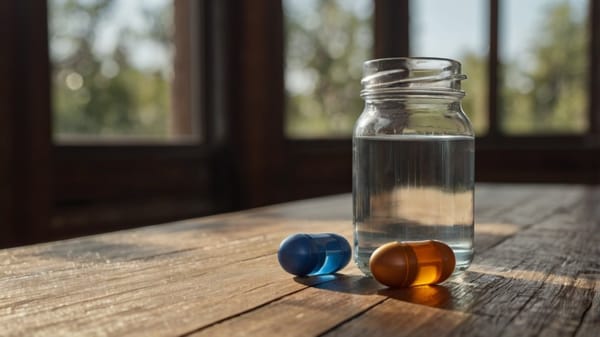Start Here If You Want to Recover Faster Without Overcomplicating It
Tired of feeling rundown? Here’s how to recover faster with simple, proven tools that support your body—without overcomplicating it.

Feel like you’re always one step behind—physically drained, mentally foggy, never quite bouncing back? It’s not your hustle that’s broken.
It’s your recovery. And if that word makes you picture pro athletes and cryo chambers, forget it. Recovery isn’t elite—it’s essential.
Whether you train hard or just power through life, your body’s constantly working to reset. The good news? You don’t need a complicated protocol to speed things up. Just smart, simple shifts that actually work.
Why Recovery Isn’t Just for Athletes
Even if you’re not training for a marathon, your body is constantly recovering from stress—physical, mental, emotional.
Every workout, work deadline, poor night’s sleep, or hit of caffeine stacks the pressure. Recovery is how your body resets and rebuilds. But when it doesn’t get what it needs, you start to feel it:
- Lingering soreness or stiffness
- Trouble sleeping deeply
- That wired-but-tired feeling
- Low energy despite rest
- Slower progress in training or day-to-day life
You don’t need fancy tools or intense routines. You need to support your body’s natural recovery systems—and that starts with understanding what actually moves the needle.

Step One: Reset Your Nervous System
Your nervous system is your command center. When it’s overstimulated, everything feels harder—sleep, digestion, muscle repair, focus.
Most people stay stuck in “sympathetic” mode: alert, tense, reactive. Recovery requires the opposite—parasympathetic activation, where your body slows down and begins to heal.
Simple ways to help your system downshift:
- Magnesium (glycinate or threonate): Supports muscle relaxation, calms the mind
- L-theanine: Eases tension without making you drowsy
- Glycine: Promotes calm focus during the day, deeper sleep at night
These aren't sedatives. They help your body transition into a state where recovery becomes possible—without dragging you down.
Step Two: Rebuild What You Deplete
Training, stress, and even regular life use up more than energy. They deplete minerals and amino acids that your body needs to repair, hydrate, and function. Start with this core foundation:
Electrolytes: Most people think of them only after long runs. But daily sweating, caffeine, and poor sleep drain sodium, potassium, and magnesium.
Without enough, muscle recovery slows and fatigue lingers. A sugar-free electrolyte mix—or a pinch of salt and lemon in water—can restore balance fast.
Protein & Collagen: Protein rebuilds muscle tissue. Collagen supports joints, skin, and connective tissue. You don’t need to obsess over macros. Just get enough throughout the day and prioritize a post-workout dose if you’re training hard.
L-Glutamine & BCAAs: Glutamine helps your gut recover from stress (often overlooked in performance).
BCAAs are optional but helpful if you're doing fasted training or long workouts—especially if your muscles tend to stay sore longer than they should.
Step Three: Sleep Like Your Progress Depends on It (Because It Does)
Sleep is the most anabolic, regenerative time your body gets. Without deep sleep, no supplement, protein shake, or training hack will move the needle.
If you’re waking up tired, restless, or mentally foggy, try a nighttime stack that actually works with your circadian rhythm:
- Magnesium glycinate: Calms nerves and muscles
- Glycine (3g): Deepens sleep without grogginess
- Reishi mushroom or Apigenin: Natural compounds that promote deeper, sustained rest
- Low-dose melatonin (if needed): Helps trigger the sleep switch, not just knock you out
Take your sleep stack 30–60 minutes before bed. Combine it with screen-free wind-down time, dim lighting, or light stretching to give your nervous system the cue to shut it down for the night.
Step Four: Don’t Overcomplicate Stacking
Let’s simplify how to use these tools throughout your day. Think of your recovery routine in two natural segments:
Morning to Midday – Protect and Replenish
- Electrolytes: First thing in the morning or post-training
- L-theanine: To stay calm and focused without burnout
- Protein/collagen: As part of breakfast or post-workout
- Glutamine (optional): Especially if you deal with gut discomfort or high stress
Evening – Shift Into Recovery Mode
- Magnesium + glycine: About an hour before bed
- Reishi or apigenin: Stacks well with magnesium
- Sleep hygiene: Lights down, screens off, calm rituals on
Stick with this basic rhythm for 5–7 days before adding more. The goal is to create a sustainable, repeatable groove—not a rigid schedule.
What About Red Light, Saunas, or Ice Baths?
If you’re already covering the basics, tools like red light therapy, infrared saunas, or cold exposure can speed things up—but they’re not essential for beginners.
Here’s the deal: recovery isn’t about chasing hacks. It’s about stacking simple, proven practices consistently. No biohack will replace sleep.
No fancy gadget will outdo magnesium and protein. If you get the foundations right, everything else is bonus—not the baseline.
Final Thoughts: Recover Smarter, Not Harder
Recovery isn’t a luxury. It’s your edge. When you start supporting your body the right way—hydration, nervous system support, sleep quality, amino acids—you don’t just feel better.
You perform better. You think clearer. You train harder without falling apart. You start to rebuild momentum that doesn’t require force or burnout.
You don’t need to be perfect. You just need to start. So pick one shift. Add one supplement. Start today. Your future self will thank you—stronger, clearer, and more dialed in.




